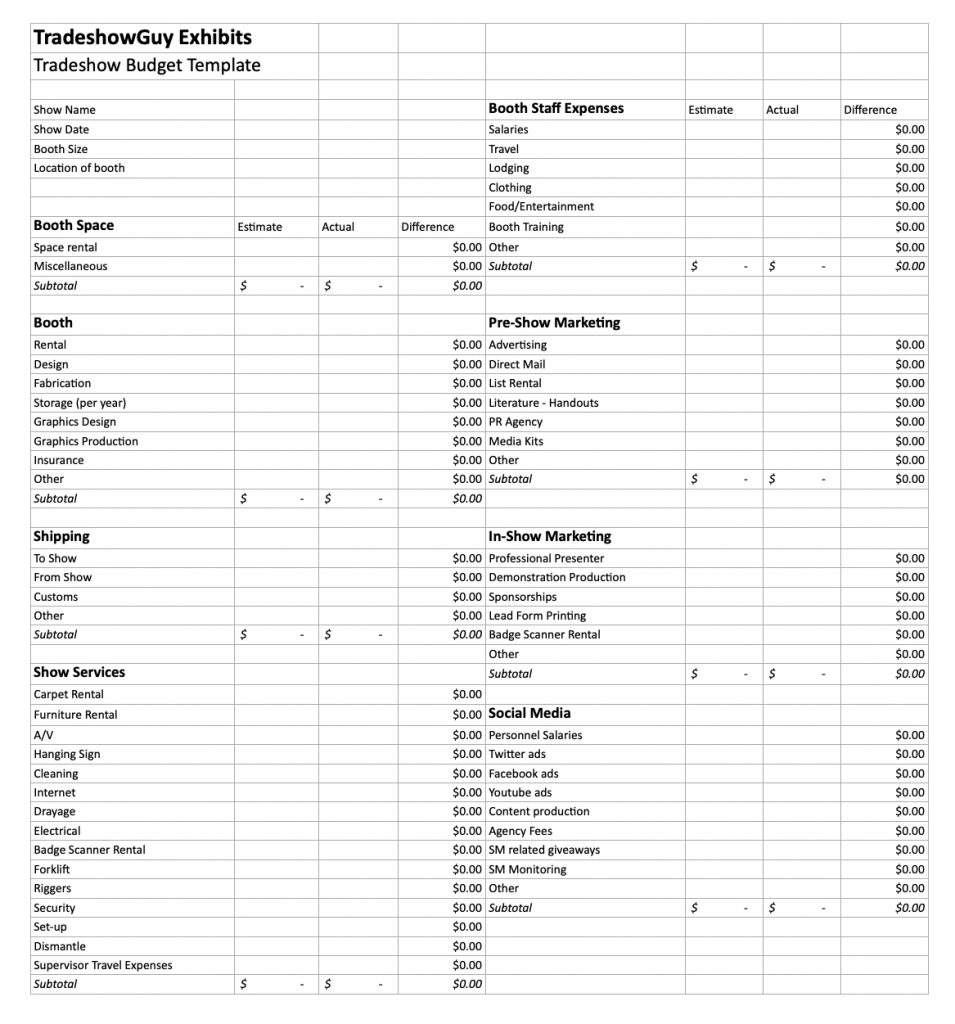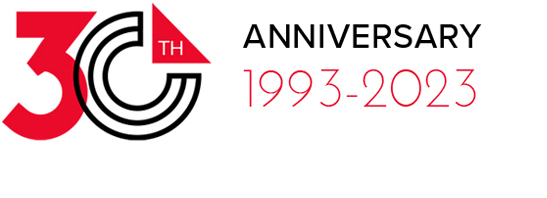
There are two kinds of trade show exhibitors: 1) those who research costs, create a budget, and document every expense, and 2) those who don’t. Don’t be #2. It’s not hard, even if you’ve never purchased a trade show exhibit before or participated in a trade show. New and unfamiliar? Yes. Complicated? Not really. Does that mean there won’t be a few surprises along the way? Of course not.
First, trade shows are expensive, and some costs are often puzzling to exhibition newbies, but there are multiple ways to manage those expenses with a little planning and some assistance from an experienced trade show professional. Don’t be afraid to tap into that expertise. You’ll find that they want you to get the biggest bang for the buck and be wildly successful with your trade show marketing.
Understanding a Trade Show Budget
There are two sides to a trade show budget: the money spent and the return on investment or return on objectives. Let’s park ROI and ROO as topics for now since every company handles those differently.
A quick search on the Internet will yield multiple budget templates or programs. See Smartsheet or ExhibitDay for example. Below is a budget spreadsheet provided by TradeShowGuyExhibits.

Every trade show budget has upfront costs and recurring expenses. For example, purchasing a display is an upfront cost. Storage for the display at an exhibit house is a recurring expense. Some upfront costs you’ll want to depreciate over time so you can better access your actual expenses per show and your ROI.
Organizing Your Trade Show Budget
To better wrap your head around the costs, let’s divide them into categories. Keep in mind that some expenses might not apply to your situation. And the budget doesn’t consider the salaries or time of anyone at your company who participates in trade show planning or participation at a show.
Exhibit
- Design Fees – Structure and Graphics
- Exhibit – Structure, and Graphics
- Shipping (if applicable)
- Ongoing Storage
- Show Services
Show Site
- Shipping (to and from the show)
- Booth Space
- Drayage or Material Handling
- Electrical
- I&D Labor
- Furniture Rental
- Flooring
- Hanging Sign Rigging (if applicable)
- Internet
Travel, Lodging, and Entertainment
- Travel/Transportation
- Hotel
- Meals
- Client Meals and Entertainment
Other
- Literature
- Promotional Products
- Housekeeping/Cleaning
- Lead Retrieval Software
- Games/Talent/Prizes
Most of these costs are self-explanatory, except for show management/storage, drayage, electrical, and labor. However, for a more extensive glossary of Trade Show Terminology, click on this link.
Show Management/Storage: If you decide to purchase (vs. rent) your exhibit, you will need to store it somewhere between shows. Exhibit Houses are happy to provide that service, along with other services like scheduling shipping, inspecting the display before and after the show, staging the display, and handling the ordering of show services.
Drayage: Drayage can be a baffling (and an often contentious) service to trade show novices. Drayage is the term for the handling of exhibit materials from the dock at the show location to the exhibitor’s booth within the show hall. Trade show participants pay a fee, based on the weight and number of packages, to have their show materials received at the dock and moved to their show space, stored during the show, and then returned at the end.
Electrical: If your booth requires electricity, and it will, there’s a cost depending on the number of amps required. In addition, some convention halls require licensed internal electricians to complete specific electrical tasks in your booth space. Check your show book for details.
I&D: Installation and Dismantling is the term given to the labor required to set up, take down, and repack an exhibit. I&D rules and rates vary depending on the show hall and show management. Check your show book for details.

Trade Show Budgeting Tips
When it comes to budgeting tips, being an insider or expert on trade shows has its benefits. Every trade show professional will gladly share their budgeting tips (generally gratis), but most fall into three groups: planning, preparation, and personality. The three Ps.
Planning: Most people are not planners. They react rather than anticipate. In the world of trade shows, there are hard deadlines whether it’s buying an exhibit, designing graphics, getting freight quotes, or completing order forms for show services. Earlier is better because there are early bird rates or because there are financial repercussions to waiting until the last minute. Those could be rush fees, overnight shipping charges, or overtime labor rates. The single most effective way to save money on your trade show program is to plan ahead.
Preparation: This is similar to planning but doesn’t require forms or specific deadlines. For example:
- Will your literature, promotional products, or demos fit in the case or crate? Fewer packages usually means lower shipping and drayage charges.
- Does everyone understand their roles at the show and any financial guidelines, like per diem or client entertainment? Same with apparel in the booth.
- Have the exhibit set-up instructions been reviewed by your labor contractor? Are there assembly nuances they need to know that are not on the instructions? Like the position of the exhibit within the booth space.
- Does the show and/or show management offer new exhibitor training and/or welcome services? Those can supercharge the process of going from a newbie to a battle-scarred veteran.
Personality: Trade shows are stressful, not just for the exhibitors but also for attendees, show management, general show contractors, and anyone who works to pull it all together. It can get tense fast because expectations are high, time is short, and lots of money is on the line. Being polite (and persistent if necessary) has benefits. People want to help people if they are gracious, respectful, and understanding. Entitlement and threats are usually counter-productive on the trade show floor.
10 Common Trade Show Budgeting Mistakes
- Not setting trade show marketing goals
- Not formulating a multi-year show schedule
- Purchasing when you should be renting. And vice versa
- Missing early bird deadlines
- Not identifying or capturing pre and post-show costs
- Attending the wrong trade shows
- Not going big enough at the right trade shows
- Not capturing metrics – quantitative and qualitative
- Ignoring show leads
- Bringing the wrong people to the show
Trade Show Management with Classic Exhibits
Classic Exhibits has been designing and building trade show and event solutions since 1993. It’s a commitment that extends beyond the structure. Tap into our expertise in trade show management to ensure your next show is your best show.
Classic Exhibits has been honored as an Exhibitor Magazine Find-It Top 40 Exhibit Producers and an Event Marketer Fab 50 Exhibit Builders multiple times. Along with numerous Portable Modular Awards.
With over 200 Distributor Partners throughout North America, there’s a Classic representative close by to assist with any rental project. Contact us today whether you need an inline rental display, a double-deck island exhibit, or a contemporary kiosk rental. At Classic, we’re not just different. We’re better.



